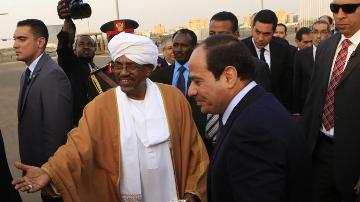Sudan’s Bashir invites Egyptian president to attend his inauguration ceremony
May 2, 2105 (CAIRO) – Sudan’s foreign minister, Ali Karti, has handed over the Egyptian president, Abdel-Fatah al-Sisi, Saturday an invitation from the Sudanese president Omer Hassan al-Bashir to attend his inauguration ceremony.

The spokesperson for the Egyptian presidency, Alaa Youssef, said al-Sisi met Karti on Saturday in the presence of Egypt’s foreign minister, Samih Shukri, pointing that al-Sisi asked the Sudanese minister to convey his greetings and appreciation for president Bashir.
He added that al-Sisi renewed congratulations for Bashir on his election victory, wishing him success in his new term and wishing the Sudanese people prosperity and progress.
Youssef pointed the Egyptian president praised the deep and historical ties between the two countries, stressing that unity of the Nile valley confers special importance in the souls of the Egyptian people on relations between the two nations.
The spokesperson further noted that al-Sisi told Karti that the Egyptian people look forward to strengthening ties between the two countries on both official and popular levels.
Karti for his part praised the positive and distinct ties between the two countries, pointing that Sudan aspires to promote relations in all domains particularly in light of the broad prospects and great potentials for developing them.
He pointed to the opening of the Eshkait-Qustul border crossing between the two countries, saying inauguration of the crossing serves as a proof for the ability of the two nations to overcome all obstacles to develop bilateral cooperation.
Youssef also said that al-Sisi underscored importance of the border crossing in reviving trade activity between the two countries, calling for the need to utilize the official and popular rapprochement to push forward bilateral cooperation in all fields particularly in the agricultural and industrial development area.
HOUSING PLAN IN WADI HALFA
Meanwhile, the governor of Sudan’s northern state, Ibrahim al-Khidir, has announced formation of committees for developing housing plans in Wadi Halfa to encourage voluntary return of the residents
Residents of Wadi Halfa were forced to leave the city following the construction of the Aswan Dam, also known as High Dam in Southern Egypt.
The Aswan Dam was built between 1960 and 1970, causing mass resettlements in lower Nubia. In Sudan, Halfa residents were sent to New Halfa, an area 700 kilometres south of their homeland.
Al-Khidir said in press reports following the opening of the Eshkait-Qustul border crossing that it would strengthen commercial and economic ties between the two countries.
He pointed that Wadi Halfa would benefit from the customs returns, saying that Sudan recently exported several commodities to Egypt through the crossing including sesame, cattle, meat, potatoes, onion, dates and spices.
The governor also noted that new electricity production line between Wawa and Wadi Halfa would push forward development projects in the region, pointing to recent the construction boom in the city of Wadi Halfa.
He said that his government allocated 72 million pounds (SDG) for local development in Wadi Halfa, saying that Sudan Telecommunication Company (Sudatel) will build an integrated services complex for the passengers in Eshkait area.
Al-Khidir also pointed to efforts to establish transformative industries in order to benefit from the added value, saying his government has embarked in the rehabilitation of the vegetables and fruits canning factory in Karema.
He said that electricity supply has been extended to 87 agricultural projects during the past two years which led to lowering cost of production and increasing the cultivated area, saying that 300.000 acres have been cultivated in the winter season including 130.000 acres of wheat.
(ST)
